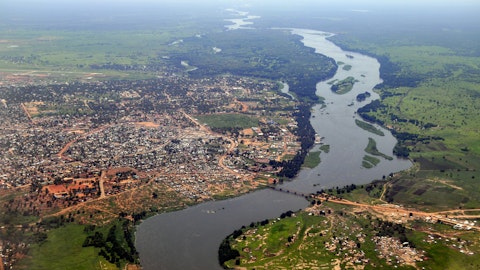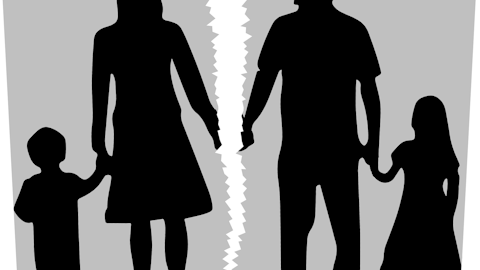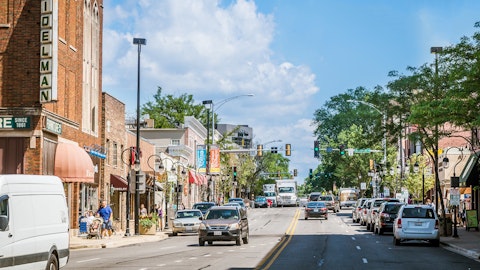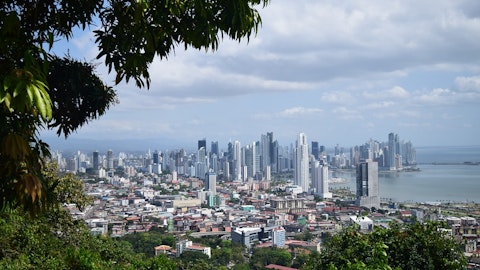In this article, we will take a look at the 20 most educated countries in Africa.
Growing up in a developed nation often leads to overlooking the luxury of education and seldom considering the millions globally who lack basic literacy skills. We can all agree that education plays a pivotal role in personal advancement, societal progress, and economic well-being. The ability to read and write opens up avenues for enhanced education and employment prospects, empowering individuals to elevate household incomes and lift their families out of impoverished conditions. Furthermore, literacy correlates with improved public health and heightened political engagement.
According to a 2020 survey conducted by the Association of American Colleges and Universities (AAC&U) in collaboration with Hanover Research, an increasing number of employers view a college education as a worthwhile investment. The survey revealed that 87% of respondents considered college education as “definitely” or “probably” worth it. Undergraduate programs, encompassing associate and bachelor’s degrees, provide a blend of general education courses and specialized learning in a chosen field of interest. These degrees facilitate the development of both broad-based and discipline-specific knowledge.
Obtaining a college degree can serve as the additional qualification that propels you into securing your desired career. Earning a bachelor’s degree not only enhances your chances of landing your dream job but may also elevate your perception of work from a mere job to a fulfilling career. According to a 2016 report from the Pew Research Center, 77% of individuals with a post-graduate degree and 60% with a bachelor’s degree feel that their jobs contribute to their sense of identity. In contrast, only 38% of those with a high school diploma or less share the same sentiment.
People who do not complete their degree experience a disparity in earnings compared to those who successfully attain a degree. This financial setback is compounded for those who financed their college education through loans. Three years post-college, a notable 22% of non-graduates find themselves with loans that are either in default or delinquent, a stark contrast to the 12% among graduates facing similar situations. The timely completion of a degree holds significance, as those who extend their educational journey beyond four years encounter additional costs, jeopardize their eligibility for financial aid, and prolong their entry into the workforce.
Higher education stands as a pivotal catalyst for driving economic advancement and serves as a crucial policy instrument for enhancing upward mobility across generations, particularly for individuals from low-income backgrounds, first-generation students, as well as Black and Latino students. The evolving landscape of a country’s economy underscores a growing demand for a workforce equipped with higher education, a trend projected to persist in the foreseeable future.
Beyond the evident advantages of increased income and superior job benefits, people with college degrees exhibit higher rates of homeownership, reduced susceptibility to poverty, and diminished reliance on social services. The broader societal impact is equally profound, contributing to lower unemployment rates, decreased dependency on public assistance programs, reduced incarceration rates, heightened tax revenue, and increased civic engagement. This collective benefit underscores the far-reaching positive consequences of higher education on both individual prosperity and the overall well-being of society.
Many African countries recognize the crucial role of education in fostering development and progress. Governments actively provide citizens with opportunities to access free and high-quality education, contributing to overall societal growth. The education system has undergone strategic enhancements, incorporating favorable structures to better serve its citizens’ educational needs. The African continent embodies a mosaic of disparities, with some nations experiencing rapid development while others face prolonged challenges. In numerous African countries, a substantial portion of families resides below the poverty line. Their children lack access to education, grappling with illiteracy and a dearth of opportunities for future learning.

Copyright: sifotography / 123RF Stock Photo
See also: 15 Best African Countries for Female Sex Tourism
Our Methodology
In creating our list of the 20 most educated countries in Africa, we conducted thorough research, meticulously verifying information from a variety of reliable sources. The selection of countries for inclusion in this list was grounded in a comprehensive review, with a primary criterion being their consistent mention across multiple reputable articles. Additionally, we considered updated rankings from various esteemed platforms such as the United Nations Educational, Scientific and Cultural Organization (UNESCO), and the World Economic Forum about the educational proficiency of African nations. Through the application of these rigorous criteria, we successfully curated our list of the top 20 most educated countries in Africa. You can also take a look at our 15 African Countries With the Most Beautiful Women article to learn more about the most attractive women in Africa, and the 25 Most Educated Countries in Africa to see how the rankings have changed.
So without further ado, let us now discuss our list of the 20 most educated countries in Africa.
20 Most Educated Countries in Africa
20. São Tomé and Príncipe
Ranking 20th in our list of the most educated countries in Africa is São Tomé and Príncipe. The country is an African island nation situated near the equator, and mandates four years of compulsory primary education. With an approximate population of more than 210,000, São Tomé and Príncipe is actively working towards expanding educational horizons by introducing opportunities for higher and technical education. Furthermore, there is a vision to provide 12 years of free education to the children in this nation.
19. Tanzania
Following our list of the most educated countries in Africa is Tanzania. The country has implemented a commendable initiative, allowing its citizens to benefit from 15 years of free education. The educational structure in Tanzania encompasses primary, secondary, advanced, and university-level education, providing comprehensive learning opportunities for its people.
18. Malawi
Malawi ranks 18th in our list of the most educated countries in Africa. The education system in Malawi mandates the first eight years of schooling, with the initial four years conducted in the local language before transitioning to English. This linguistic balance aims to strengthen the educational foundation. Despite encountering challenges, the Malawian government is committed to providing free primary education, ensuring widespread access to learning opportunities.
17. Burundi
Burundi was able to secure the 17th spot in our list of the most educated countries in Africa. In Burundi, education is mandatory for six years, spanning ages seven to 13, with primary education theoretically provided free of charge. The country, with a population of more than 11.8 million, structures its primary education over six grades within this age range. Following this, the next educational structure includes lower secondary, encompassing an additional four grades, to further develop students’ academic journey.
16. Gabon
Gabon landed in the 16th spot in our list of the most educated countries in Africa. Gabon’s educational framework aligns closely with the French system, with a population of more than 2.2 million. The country enforces compulsory education for children aged 6 to 16, as mandated by the Education Act. Commencing their educational journey, most Gabonese children attend nurseries and kindergartens. At the age of 6, they enter primary school, which comprises six grades. Subsequently, secondary school follows, spanning seven grades, with an anticipated graduation age of 19. Graduates from secondary school have the option to pursue higher education, including universities, engineering schools, or business schools.
15. Rwanda
Rwanda stands out for its exceptional education system, structured on a 6-3-3-4 model, encompassing 6 years of Primary school, 3 years of junior secondary education, followed by 3 years at the secondary level. The tertiary stage, including university education, extends over 4 years. With an estimated population of 12,300,000, Rwanda takes pride in its commitment to enhancing school enrollment and attendance, particularly for underprivileged children. In line with this goal, the government implemented free education in 2003, fostering more inclusive educational opportunities.
14. Namibia
Namibia prioritizes education as a fundamental right for all its citizens. The Namibian constitution mandates the government to ensure that every individual aged 6 to 16 receives a 10-year education, covering academic expenses. While the government covers tuition fees, parents are responsible for additional costs like accommodation and school uniforms. Notably, Namibia is home to over 1,500 schools, although it lacks prominent tertiary institutions.
13. Egypt
Egypt’s government is committed to providing mandatory and cost-free education for Egyptians aged six to 15 years. This initiative reflects the nation’s dedication to ensuring widespread access to primary education. Furthermore, there are ongoing considerations and discussions regarding the possibility of extending compulsory education to the secondary level. This strategic approach aims to enhance educational opportunities and contribute to the overall development of the country.
12. Algeria
Ranking 12th in our list of the most educated countries in Africa is Algeria. The Algerian government prioritizes education by providing cost-free schooling to its children and mandating compulsory attendance for citizens aged six to fifteen. This commitment to education extends to the secondary level, serving as a bridge towards higher education. Algeria, standing as the second Northern African country with a commendable education system, reflects its dedication to fostering learning opportunities and academic excellence for its people.
11. Tunisia
Since achieving independence from France in 1956, Tunisia has been dedicated to crafting an education system that cultivates a robust human capital base capable of meeting the evolving demands of a developing nation. Ongoing structural reforms since the early 1990s, coupled with prudent macroeconomic policies and deeper integration into the global economy, have created a conducive environment for growth. Rooted in the French model, Tunisia’s education reformers focused on Arabizing the curriculum and faculty across the nation’s schools and universities.
The Tunisian government has demonstrated a strong commitment to pre-school education, with a specific emphasis on providing instruction in designated places for children aged three to six. The foundational Enseignement de Base spans nine years, comprising six years of primary and three years of preparatory education. The subsequent four years of secondary education are accessible to all Diplôme de Fin d’etudes de l’Enseignement de Base holders, with students choosing to either pursue university-level education or enter the workforce upon completion. The Enseignement secondary is further divided into two stages: general academic and specialized tracks.
10. Equatorial Guinea
Landing on the 10th spot in our list of the most educated countries in Africa is Equatorial Guinea. Recognized as one of the African nations boasting a commendable literacy rate, Equatorial Guinea holds the 126th position globally in educational rankings. Noteworthy is the fact that education in this nation is both free and mandatory up to the age of 14. The educational framework encompasses various tiers, including preschool, primary, secondary, and university levels, reflecting the commitment of the Equatoguinean government to providing a comprehensive and accessible educational journey for its citizens.
9. Ghana
Ghana was able to secure the 9th spot in our list of the most educated countries in Africa. The educational landscape in Ghana is structured into three key levels: basic, secondary, and tertiary education. Notably, basic education is both free and mandatory for children between the ages of 4 and 15, with the provision extending until the age of 12. This commitment to accessible education has contributed to Ghana’s prominence in various professional fields such as law, business, pharmacy, engineering, and medicine. The competitive nature of the university level underscores the country’s dedication to fostering excellence in education and solidifying its position as a standout player in the global educational arena.
8. Kenya
Kenya adheres to an 8-year primary education system, and while education isn’t compulsory, the government ensures accessible pathways for citizens to complete this foundational period. Since gaining independence in 1963, Kenya has weathered political challenges and undergone substantial reforms, yet it has successfully maintained an impressive education system, contributing to an enviable literacy rate of 85.10%. Currently, Kenya boasts a network of 30 tertiary institutions, establishing itself as a hub for higher education that attracts international students seeking top-notch academic standards.
7. Botswana
Botswana holds the seventh position among the most educated countries in Africa, boasting a population of 2,351,627 and an impressive literacy rate of 88.50%. While education in Botswana is provided without charge, it is not obligatory. The Ministry of Education oversees the nation’s entire educational framework, excluding the University of Botswana. Although schooling is not compulsory, the initial decade, commencing at age six, is tuition-free. This period encompasses seven years of primary education, with the first four years conducted in Setswana and subsequent classes in English.
6. Libya
Ranking 6th in our list of the most educated countries in Africa is Libya. The Libyan government ensures both the provision and compulsion of free primary education for its citizens, underscoring its commitment to education. Despite grappling with a history of civil war, Libya is currently making concerted efforts to restore stability and order. Notably, Libya stands out as one of the most educated African nations, leveraging its abundant oil reserves to emerge as one of the wealthiest countries on the continent.
5. Zimbabwe
Zimbabwe ranks 5th in our list of the most educated countries in Africa. Zimbabwe’s educational framework comprises a seven-year primary phase followed by six years of secondary education, laying the foundation for students to pursue higher education within the country or abroad. The academic calendar in Zimbabwe spans from January to December, featuring three-month terms interspersed with one-month breaks, resulting in a total of 40 weeks of schooling annually.

Pixabay/Public Domain
4. Cape Verde
Cape Verde holds the 4th position in our list of the most educated countries in Africa. Cape Verde has instituted a formal education system structured as six years of primary schooling, commencing at the age of 6 and continuing for the subsequent six years. Positioned as a small island nation, Cape Verde is poised to emerge as one of the most educated countries in Africa, firmly securing its place among the top 10 in the continent. The educational framework is designed with a six-year duration for primary school, followed by a three-year lower secondary stage, and culminating in a three-year upper secondary phase. As of 2018, Cape Verde boasts a total enrollment of 120,000 students in both primary and secondary education. Notably, approximately 64,000 pupils, constituting 53%, are actively engaged in primary education.






